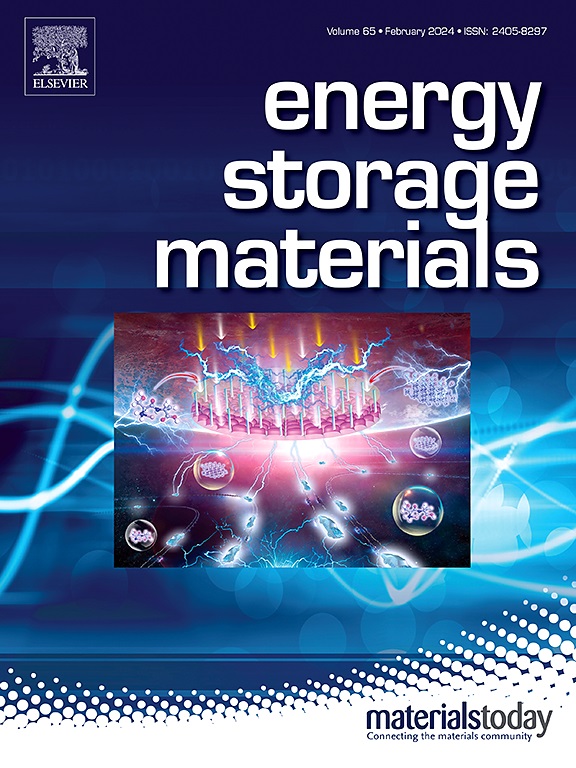All-soluble all-iron aqueous redox flow batteries: Towards sustainable energy storage
IF 18.9
1区 材料科学
Q1 CHEMISTRY, PHYSICAL
引用次数: 0
Abstract
All-iron aqueous redox flow batteries (AI-ARFBs) are attractive for large-scale energy storage due to their low cost, abundant raw materials, and the safety and environmental friendliness of using water as the solvent. However, traditional deposition-type AI-ARFBs suffer from limitations in charge and discharge depth due to the coupling of energy and power. In contrast, all-soluble AI-ARFBs (ASAI-ARFBs), which feature fully soluble iron species throughout charge and discharge cycles, achieve the decoupling of energy and power, thus overcoming the limitations and improving operational scalability. Despite their benefits, challenges remain in redox species solubility, electrolyte stability, electrode reactivity, membrane selectivity and capacity decay mechanism. This review provides a comprehensive overview of current research on ASAI-ARFBs, focusing on the needs for robust electrolytes, advanced electrode structures, durable membrane materials and in-situ characterisation techniques to address these challenges and enhance their performance. Additionally, this review highlights the importance of integrating renewable energy technologies with ASAI-ARFBs to boost their commercialisation potential.
全溶全铁水氧化还原液流电池:迈向可持续能源储存
全铁水氧化还原液流电池(AI-ARFBs)具有成本低、原料丰富、以水为溶剂安全环保等优点,在大规模储能领域具有广泛的应用前景。然而,传统的沉积型ai - arfb由于能量和功率的耦合,充放电深度受到限制。而全可溶性AI-ARFBs (ASAI-ARFBs)在整个充放电循环中具有完全可溶的铁,实现了能量和功率的解耦,从而克服了局限性,提高了操作可扩展性。尽管它们具有优势,但在氧化还原物质的溶解度、电解质稳定性、电极反应性、膜选择性和容量衰减机制方面仍存在挑战。本文综述了目前asai - arfb的研究概况,重点介绍了对坚固电解质、先进电极结构、耐用膜材料和原位表征技术的需求,以解决这些挑战并提高其性能。此外,该综述强调了将可再生能源技术与asai - arfb整合以提高其商业化潜力的重要性。
本文章由计算机程序翻译,如有差异,请以英文原文为准。
求助全文
约1分钟内获得全文
求助全文
来源期刊

Energy Storage Materials
Materials Science-General Materials Science
CiteScore
33.00
自引率
5.90%
发文量
652
审稿时长
27 days
期刊介绍:
Energy Storage Materials is a global interdisciplinary journal dedicated to sharing scientific and technological advancements in materials and devices for advanced energy storage and related energy conversion, such as in metal-O2 batteries. The journal features comprehensive research articles, including full papers and short communications, as well as authoritative feature articles and reviews by leading experts in the field.
Energy Storage Materials covers a wide range of topics, including the synthesis, fabrication, structure, properties, performance, and technological applications of energy storage materials. Additionally, the journal explores strategies, policies, and developments in the field of energy storage materials and devices for sustainable energy.
Published papers are selected based on their scientific and technological significance, their ability to provide valuable new knowledge, and their relevance to the international research community.
 求助内容:
求助内容: 应助结果提醒方式:
应助结果提醒方式:


